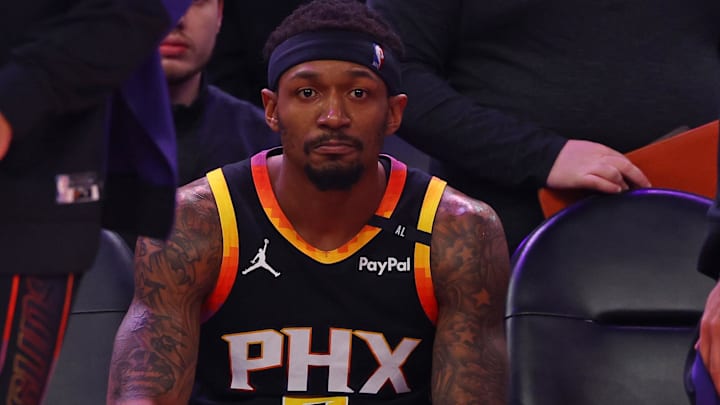It turns out the Bradley Beal acquisition is the transaction that keeps on giving punishing the Phoenix Suns. Not only does his no-trade clause hamstring the team’s ability to move him, but an arcane quirk in the NBA’s collective bargaining agreement basically prevents them from even paying him to leave.
Many have recently wondered whether the Suns would consider waiving and stretching Beal. For context, teams are generally allowed to waive a player, and then spread out the money owed to them over double the number of years left on their contract, plus an additional season.
Theoretically speaking, the Suns would waive the two seasons and $110.8 million remaining on Beal’s contract, and then pay him around $22.2 million per year through 2029-30. That’s a hefty chunk of dead change, but if the Phoenix is desperate to cut costs or make other moves, it would lower the team’s commitment to the 32-year-old by over $30 million through the next two seasons.
Yet, we must emphasize the theoretically speaking aspect here. Because legally speaking, the Suns aren’t allowed to do this.
The Suns actually can’t waive-and-stretch Bradley Beal
As Fred Katz of The Athletic notes, there is a “niche rule” in the Association's CBA that disallows teams from having waived-and-stretched money on the books that exceeds 15 percent of the salary cap. Though Beal’s stretched number for next year would account for roughly 14 percent of the salary cap, Phoenix already has other dead money on its ledger.
E.J. Liddell and Nassir Little were waived-and-stretched by the Suns last offseason, and remain on the cap sheet now. Their combined stretched salary for the 2025-26 campaign checks in around $3.8 million.
If you tack that onto Beal’s $22.2 million, you get to around $26 million. That comes out to 16.8 percent of the 2025-26 salary cap ($154.7 million)—which, as anyone can see, exceeds the 15 percent limit.
Bradley Beal would need to facilitate getting waived-and-stretched
Phoenix can still technically waive-and-stretch Beal—provided he cooperates, and is willing to give money back as part of a buyout. That isn’t uncommon in these circumstances, but the amount of cash he’d need to forfeit makes the entire scenario a wild card.
The Suns need to get their total stretched money for next season down to $23.2 million. Using that combined $26 million figure from before, this means they need Beal to give back $14 million total, for an average of $2.8 million less per year.
Making up that chunk of change isn’t impossible. It basically requires Beal having a team lined up to pay him the non-taxpayer mid-level exception next year ($14.1 million), or signing somewhere and making an average of $7 million over the next two seasons.
But remember, this would be Beal breaking even. If he wants to come out ahead, he’ll need to average more than $7 million in salary over the next two seasons for a new team. Anything less, and he’d simply be doing the Suns a solid for the right to choose where he plays.
Except, well, he can already technically do that thanks to his no-trade clause. The calculus changes if he’s desperate to get out of Phoenix, but there’s no reporting to suggest he’s itching to relocate.
Frankly, the Suns are better off being forced to take their medicine. Having $20-plus million in dead money on the books for the next half-decade is hardly a drop in the bucket. Still, this is just the latest reminder in a growing number of them that Phoenix never should have made the Beal trade in the first place.
